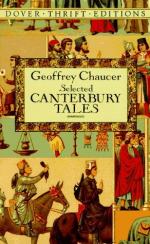|
|
The Canterbury Tales The General Prologue
The Canterbury Tales begin in April, as the narrator (Chaucer) begins a pilgrimage from the Tabard Inn at Southwerk to the famed Canterbury, where Sir Thomas a Becket, a martyr for Christianity, is supposedly buried. The General Prologue is a basic descriptive list of the twenty-nine people who become pilgrims to journey to Canterbury, each telling a story along the way. The narrator describes and lists the pilgrims skillfully, according to their rank and status.
"Whan that Aprill with his shoures soote
The droghte of March hath perced to the roote,
And bathed every veyne in swich licour
Of which vertu engendred is the flour,
Whan Zephirus eek with his sweete breeth
Inspired hath in every holt and heeth
The tender croppes, and the yonge sonne
Hath in the Ram his halve cours yronne,
And smale foweles maken melodye,
That slepen al the nyght with open ye
(So priketh hem nature in hir corages),
Thanne longen folk to goon on pilgrimages,
And palmers for to seken straunge strondes,
To ferne halwes, kowthe in sondry londes;
And specially from every shires ende
Of Engelond to Caunterbury they wende,
The hooly blissful martir for to seke,
That hem hath holpen whan that they were seeke." General Prologue, l.1-20
The first pilgrim mentioned in the prologue is properly the Knight, a worthy man who has fought in the crusades. A Squire accompanies the Knight as his son and is a young bachelor of twenty years with an eye for women. The Knight also brings along his Yeoman, or his second servant. A shy, polite Prioress who is well mannered and proper wears a fine broach with inscriptions about love, her secretary, also known as the Second Nun, and a Monk also join the pilgrims to see the martyr. The Monk loves to hunt and is robust and masculine, while the friar, Friar Hubert, is an overtly immoral man who cares more about money and profit than truly helping men stay away from sin.
Topic Tracking: Christianity 1
Next in the prologue is the Merchant from Flanders who is pompous and verbose on economics. He continually talks about increasing his profits in several ways. Although simply concerned about money, the narrator comments that he is truly a good man, nonetheless. The Clerk is an unemployed Oxford student making the pilgrimage perhaps to help him find money and a job. He is dressed in rags, alluding to his impoverished status. The Man of Law is a revered soul who believes he is owed respect, for he is knowledgeable of the law and appears to be much busier than he is in actuality. The Franklin accompanies the Man of Law on the pilgrimage and is simply concerned with the pleasures in life - namely food. His desires lie far from those of academia and worship.
The narrator then gives a list of five guildsmen of little importance on this trip. They are the Weaver, the Dyer, the Carpenter, the Tapestry-Maker, and the Haberdasher. There is also a Cook and a Shipman (or Sailor) from the port of Dartsmouth, and a Physician. The strong-willed Wife of Bath also makes the journey to Canterbury, wears bright, ostentatious clothing for the ride and tells of her five marriages and multiple youthful partners in bed, striking intrigue and curiosity amongst the pilgrims on the journey.
The next pilgrim is the Parson, a man of honor and kindness who remains true to Christ and his congregation. His brother, a Plowman, is also on the journey and is described with equally benevolent words by Chaucer. The last few pilgrims who are mentioned briefly are a physically large Miller, an intellectual and academic Manciple from a lawyer's college, a slender, fiery-tempered Reeve, a Summoner, and a Pardoner. The Summoner is immoral and unfair in his position of summoning people to church for their crimes, for he picks and chooses those whom he likes and dislikes, while the poor Pardoner is simply weak and effeminate.
Topic Tracking: Christianity 2
All of these travelers are in the Tabard Inn prepared to make their way to Canterbury. The host, now described as a merry, bold, strong man, makes the recommendation that each person tell two stories on the way to Canterbury and two stories on the way back. Everyone draws from a bundle to select the first taletellers and the Knight is the fortunate soul who begins these tales on the way to Canterbury.




